We tend to think of Caribbean reefs as the sparsely populated, inferior versions of their Pacific counterparts. It is true Indo-Pacific bio-diversity is unrivaled by any reefs, but Caribbean reefs weren’t always the wastelands most are nowadays (as the video we share below will show).
That is largely the fault of man. While warming oceans and acidification are serious concerns for long-term welfare, reefs demonstrate remarkable resiliency if man can temper our other destructive behaviors.
The data published in a joint report on the status of Caribbean coral reefs by the Global Coral Reef Monitoring Network (GCRMN), the International Union for Conservation of Nature (IUCN) and the United Nations Environment Programme (UNEP) is impressive. The study shows us that reefs can be saved if people would stop overfishing (particularly parrotfish and other large grazers) and better manage coastline development for tourism and agriculture.
This is unfortunately easier said than done. While reef management officials and scientists embrace the data and its policy recommendations, politicians are under heavy pressure by tourism and fishery lobbies, thus making any improvements from the status quo painfully slow (if at all) no matter how clear the science and recommendations may be.
For those who prefer watching a video instead of reading a synopsis, you’re in luck. VideoTakes shared this terrific video to complement the report.
For those who prefer to read about the findings, here is the news release issued by the IUCN. You can read the full report at: http://cmsdata.iucn.org/downloads/caribbean_coral_reefs___status_report_1970_2012.pdf
The organizations also published a joint executive report (essentially a summary and recommendations to policymakers).
From despair to repair: Dramatic decline of Caribbean corals can be reversed
With only about one-sixth of the original coral cover left, most Caribbean coral reefs may disappear in the next 20 years, primarily due to the loss of grazers in the region, according to the latest report by the Global Coral Reef Monitoring Network (GCRMN), the International Union for Conservation of Nature (IUCN) and the United Nations Environment Programme (UNEP).
 The report, Status and Trends of Caribbean Coral Reefs: 1970-2012, is the most detailed and comprehensive study of its kind published to date – the result of the work of 90 experts over the course of three years. It contains the analysis of more than 35,000 surveys conducted at 90 Caribbean locations since 1970, including studies of corals, seaweeds, grazing sea urchins and fish.
The report, Status and Trends of Caribbean Coral Reefs: 1970-2012, is the most detailed and comprehensive study of its kind published to date – the result of the work of 90 experts over the course of three years. It contains the analysis of more than 35,000 surveys conducted at 90 Caribbean locations since 1970, including studies of corals, seaweeds, grazing sea urchins and fish.
The results show that the Caribbean corals have declined by more than 50% since the 1970s. But according to the authors, restoring parrotfish populations and improving other management strategies, such as protection from overfishing and excessive coastal pollution, could help the reefs recover and make them more resilient to future climate change impacts.
“The rate at which the Caribbean corals have been declining is truly alarming,” says Carl Gustaf Lundin, Director of IUCN’s Global Marine and Polar Programme. “But this study brings some very encouraging news: the fate of Caribbean corals is not beyond our control and there are some very concrete steps that we can take to help them recover.”
Climate change has long been thought to be the main culprit in coral degradation. While it does pose a serious threat by making oceans more acidic and causing coral bleaching, the report shows that the loss of parrotfish and sea urchin – the area’s two main grazers – has, in fact, been the key driver of coral decline in the region. An unidentified disease led to a mass mortality of the sea urchin in 1983 and extreme fishing throughout the 20th century has brought the parrotfish population to the brink of extinction in some regions. The loss of these species breaks the delicate balance of coral ecosystems and allows algae, on which they feed, to smother the reefs.
Reefs protected from overfishing, as well as other threats such as excessive coastal pollution, tourism and coastal development, are more resilient to pressures from climate change, according to the authors.
“Even if we could somehow make climate change disappear tomorrow, these reefs would continue their decline,” says Jeremy Jackson, lead author of the report and IUCN’s senior advisor on coral reefs. “We must immediately address the grazing problem for the reefs to stand any chance of surviving future climate shifts.”
The report also shows that some of the healthiest Caribbean coral reefs are those that harbour vigorous populations of grazing parrotfish. These include the Flower Garden Banks National Marine Sanctuary in the northern Gulf of Mexico, Bermuda and Bonaire, all of which have restricted or banned fishing practices that harm parrotfish, such as fish traps and spearfishing. Other countries are following suit.
“Barbuda is about to ban all catches of parrotfish and grazing sea urchins, and set aside one-third of its coastal waters as marine reserves,” says Ayana Johnson of the Waitt Institute’s Blue Halo Initiative which is collaborating with Barbuda in the development of its new management plan. “This is the kind of aggressive management that needs to be replicated regionally if we are going to increase the resilience of Caribbean reefs.”
Reefs where parrotfish are not protected have suffered tragic declines, including Jamaica, the entire Florida Reef Tract from Miami to Key West, and the U.S. Virgin Islands.
The Caribbean is home to 9% of the world’s coral reefs, which are one of the most diverse ecosystems on the planet. Caribbean reefs, spanning a total of 38 countries, are vital to the region’s economy. They generate more than US$ 3 billion annually from tourism and fisheries and over a hundred times more in other goods and services, on which more than 43 million people depend.
Quotes from IUCN partners:
“The Caribbean coral reefs thread along thousands of kilometres of coastline, providing a source of food and livelihood for millions. Unfortunately, these valuable ecosystems are under mounting pressures from human activities which contribute to the degradation and damage of sediment and pollution to coastal waters. Coral bleaching caused by the rising sea temperature adds to the challenge, weakening and killing corals in numerous locations,” said UN Under-Secretary-General and UNEP Executive Director, Achim Steiner. “Coral reef degradation and mortality will significantly impact the region’s economy through reduced habitat for fish and shellfish, diminished tourism and reduced capacity to protect the shoreline against rising sea levels,” he said, adding: “We need strong collaboration at the local, national and regional levels to build resilience and reduce threats to coral reefs and the livelihoods of those who depend on them.”
“The decline in corals started long before climate change began to affect reefs,” says Terry Hughes, author of the 1994 study that predicted the current problems due to parrotfish removal. “This report confirms that vigorous populations of grazing parrotfish are a common attribute of the healthiest Caribbean coral reefs. These ‘resilient reefs’ have strong local protections that are strictly enforced and double or triple the average coral cover of the 14% seen throughout the Caribbean.”










0 Comments